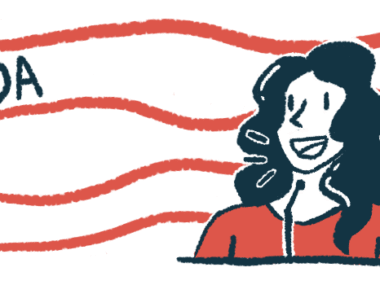I Don’t Fear the Word ‘Disabled’ — I’m Embracing It
Written by |

“But you’re not really disabled.”
I’ve heard those words, or words to that effect, a few times in my life.
Folks have always said this to me with good intent, seeking to give me hope and encouragement as I manage the symptoms that come with Charcot-Marie-Tooth disease (CMT). And I genuinely appreciate the good intentions and always feel well loved as a result.
Yet, unlike most words and well wishes offered up to send good vibes my way, I often feel conflicted by such outright and simple rejections of the term disabled. Indeed, when I think of the words independently — “not really disabled” — it reminds me of the complicated feelings the word disabled evokes. Disabled is a label I feel at peace with now, but I’ve struggled with it in years past.
These days, I call myself disabled because I’m a person with CMT. And for me, that means I’m perhaps a bit clumsier than most, a bit weaker than most, and experience challenges and limitations that most others do not. I sway when I walk, and I roll my ankles every time I take a step.
So, the disabled label is, and has always been, a fairly simple matter between my physicians and me, at least from a medical perspective. But that’s not quite the entirety of it. For the past few years, I’ve worked to embrace the word. There’s an emotional and social aspect to it, too.
I embrace the disabled term because it reminds me to take pride in the disability rights movement and to strive to continue to promote awareness and acceptance in the things I do. It’s a reminder to stand in solidarity with the community that makes up more than 26% of Americans who experience similar struggles and pains, but also joy.
But I know there’s also a lot of stigma and confusion around the word disabled. And because of that, I can understand why folks may see it as an attractive idea to eschew the term and withhold it from loved ones, and to go so far as to try to assure folks like me that we can’t be “disabled” and shouldn’t think of ourselves that way — a benevolent erasure.
But for me and many others, disabled does not mean suffering from something that can only cause misery. It’s not a boogeyman that crushes dreams, it’s not a crutch or an excuse, and the word shouldn’t be a weight on anyone’s heart. It’s not as if keeping the word out of my lexicon will also stave off the symptoms of CMT.
So, if it’s because of fears of such associations that some folks hesitate to use “disabled,” I think it’s a bit of a waste — a waste of energy, and a waste of an opportunity to listen and show solidarity.
However, it’s not as if I don’t think there are a few valid and legitimate concerns. I know a few CMTers who wish there were a different way to describe their experience.
I don’t love the fact that the word is the same one I hear in the police car chase videos my brother sends me on occasion, used in reference to vehicles taken out of commission. And I know my perspective may be English-centric. Sandy Ho, a disability community organizer, activist, and disability policy researcher, writes in her contribution to the anthology “Disability Visibility” that there was a time when the prevailing Chinese word for disabled was 残废 (cánfèi), a word that also meant useless. And no one is useless.
Disabled is not a perfect word, but it’s also not a word to be afraid of.
***
Note: Charcot-Marie-Tooth News is strictly a news and information website about the disease. It does not provide medical advice, diagnosis, or treatment. This content is not intended to be a substitute for professional medical advice, diagnosis, or treatment. Always seek the advice of your physician or other qualified health provider with any questions you may have regarding a medical condition. Never disregard professional medical advice or delay in seeking it because of something you have read on this website. The opinions expressed in this column are not those of Charcot-Marie-Tooth News or its parent company, Bionews, and are intended to spark discussion about issues pertaining to Charcot-Marie-Tooth.






Leave a comment
Fill in the required fields to post. Your email address will not be published.